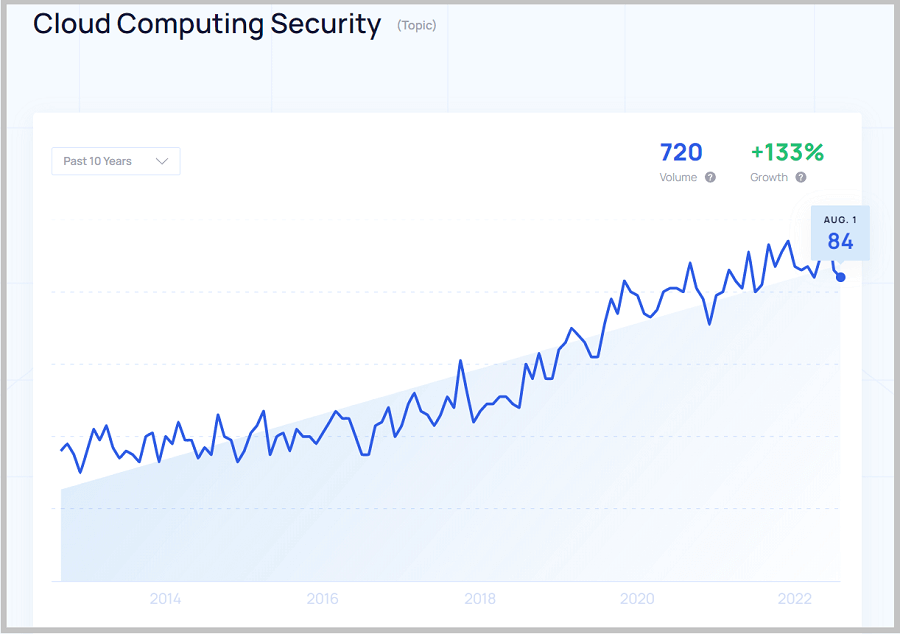Cloud computing is not limited to having virtually set up workspace amenities because it’s supplying unlimited storage and structure.
In this guide, we’ve listed the best prerequisites that will help you become a successful cloud computing engineer.
Let’s get started!
- What is cloud computing?
- Cloud computing prerequisites
- Why learn cloud computing prerequisites
- How to start learning cloud computing
- Final words
What is Cloud Computing?
Cloud computing provides various computing services over the Web3, on demand. These services include storage facilities, servers, analytics, databases, networking, and even blockchain and artificial intelligence distributed to the end users from an independent data center. Each data center is a massive storage tank for data and services enabled by cloud computing technology.
Embedding these technologies in the modern world, businesses not just cut down heavily on expenditure but also enhance the systems’ speed and efficiency. In addition, cloud computing allows for better scalability through advanced analytics, greater networking and connectivity, faster and reliable disaster recovery, and improved security. And so, this has grown into a burning topic to learn and master.
Cloud Computing Prerequisites
As cloud computing became one of the most widely used technologies in businesses and organizations, the demand for having it in one’s skill set also skyrocketed:
1. Programming Skills
Programming has become a top-rated skill in any field, and cloud computing is no exception. Cloud computing employs a lot of coding for continuous development and good maintenance. Languages like Java, Python, and PHP are among the most required in programming.
In addition, your job may require you to assist in cloud computing application development. Or you have to create a program with negligible errors. All these activities will require you to brush up on your programming skills and perform at the top gear, so the coding experience is vital.
Here are some most in-demand programming languages of cloud computing that need to learn to make your career in cloud computing:
- Python
- Java
- Go
- C++
- Ruby
Among the various programming languages, Ruby on Rails deserves special mention when it comes to eCommerce development. Ruby on Rails is an open-source web application framework built on Ruby, designed to simplify the development process and increase productivity.
Its convention-over-configuration approach and vast ecosystem of libraries and plugins make it an ideal choice for building robust and scalable eCommerce platforms.
For businesses looking to build eCommerce applications efficiently and cost-effectively, one option to consider is to hire offshore Ruby on Rails developers. Many popular eCommerce solutions, such as Spree Commerce and Shopify, are built using Ruby on Rails, offering developers a solid foundation and a wealth of features out of the box.
2. Basics of databases
Databases are storage spaces that allow companies to input their information and access it as per requirements. And as cloud computing’s provision of databases on demand keeps increasing, having basic knowledge of the workings and fundamentals of databases can come in handy.
Moreover, relational database systems function with SQL programming language with technologies like MySQL and Apache Hadoop.
Thus, getting a firm grip on this cloud computing prerequisite can greatly elevate your worth.
However, you can skip over the technicalities or in-depth learning of these languages for your beginner’s period and grasp the basic understanding without experiencing much discomfort in your journey.
📌 Relevant read: How Long Does It Take To Learn CSS?
3. An overview of security
One of the major concerns of the digital space today is the security branches and leaks of private leaks online. This also comes with the hackers forming an extra threat to one’s online security. Hence, maintaining an unbreachable and secure environment tops the wishlist of any given company today.
In cloud computing, there are several tools & services available that help businesses in achieving & maintaining compliance. Cryptography and encryption are suggested for enhancing cybersecurity, and even being familiar with the topics is better than none.
4. Virtualization
Virtualization is the base of cloud computing systems, as it deals with creating virtual spaces for operations and infrastructures. This usually requires a software-based approach to generate networks and virtual storage spaces for the companies that take up cloud computing aid.
Virtualization is an undeniable factor in cloud computing as it lowers operations and storage costs and even proposes an alternative of having software-solved processes instead of increasing the hardware. Hence, learning the process of virtualization can benefit your career immensely.
5. Basics of Agile Development
Agile development is a technique in the newfound software development practices that works extensively on feedback-based development to curate the product to the client’s requirements. This process also demands a highly organized approach for the developers to narrow down to a single solution to collective issues.
For example, you can take mobile apps and continuous development from the feedback modules to enhance their product and compete better in the market. Agile development is also a hot skill to pursue thanks to its greatly satisfactory results. Thus, you can acquaint yourself with agile development for maximum utility and potential.
6. Understanding Types of Cloud
Cloud computing comprises three different types of clouds, namely the public, private and hybrid clouds. The public cloud, for instance, has collective access to the computer facility and helps in growth better than the other two.
The private cloud operates without sharing control over the functionality. The hybrid cloud combines the first two and even offers advantages over both. All three types have their separate pros and cons associated with their uses and purposes.
Why do you need to Learn Cloud Computing Prerequisites?
Here are three data-driven reasons why you should learn cloud computing skills in the first place.
Well, listed down below are the reasons to convince you of cloud computing supremacy in the tech world today.
1. Cloud Computing is a Trending Technology
The cloud computing market size is expected to reach up to $947.3 billion by 2026 and its demand is growing at an annual growth rate of 16.3%, according to marketsandmarkets. Cloud computing covers everything, whether handling security issues or building up effective networking.
Almost all businesses today employ cloud computing because of its fast and highly effective services. It clearly shows that cloud computing is here to stay and the demand will keep growing rapidly.
Adding to all these benefits is cost-cutting, thanks to the software-based infrastructure rather than needing more hardware for businesses to function. Companies are adopting cloud computing technology for growth, scalability and to achieve business goals.
2. Global scale Demand of Cloud Computing

With cloud computing, a global network can be built easily and maintained with even more expertise. And various types of clouds today have different functions that allow for building, shared or privately owned and controlled groups and collaborations. Around 50% of the world’s corporate data is stored in the cloud, according to statistics.
It also means that regardless of the company’s physical location, an effective joint venture is always possible.
Hence, learning the cloud computing prerequisites beforehand can be a grand save for you.
3. High-Salary Job Opportunities
Currently, there are more than 704,934+ cloud computing jobs available, according to LinkedIn. Careers in cloud computing are some of the high-demand fields today.
And it is accompanied by handsome pay as well. The average salary for cloud computing is $1,09,262 per year, according to Glassdoor.
Moreover, cloud computing job requirements encompass the basic digital and coding skills that anyone interested in the respective field will probably have a good knowledge of.
In addition, you can have more in-demand skills like coding and knowledge of databases and more to open newer opportunities.
How to Start Learning Cloud Computing?
Computing prerequisites are diverse to pick up on, but once you master them, chances are you are only leveling up. You can start by familiarizing yourself with the basics and work your way up.
Follow the steps below to kickstart your learning journey in cloud computing prerequisites:
Step 1. Learn the basic fundamentals of Cloud Computing
Before taking up a new skill or growing yourself in the niche, learn the basics for clarity and concept. A solid foundation will be the base for your future work and learnings, hence spend time on it and learn as much as you can before proceeding.
For example, you can learn a simple syntax, master it and move on to the next. Note that you don’t have to be a perfectionist and are allowed to have average knowledge in the beginning.
Step 2. Work on Cloud Computing Projects
What better way to practice than to practically try out newly learned skills and project materials? Working on projects of your own can help you try out new methodologies and point out your mistakes faster than anything else. Sometimes you think you have cleared a concept until you try it out yourself.
So, if you’re planning to build some projects on cloud computing then here are some unique ideas that you can use consider:
- Cloud-enabled attendance system
- Online blood bank system
- Online cloud-enabled bookstore system
- Detecting data leaks using SQL injection
- Cloud-based bus pass system
- To create a Chatbot
📌 Check out this guide to get the latest cloud computing research and seminar topics
Step 3. Build Connections with Cloud Computing Experts
You can collaborate with pros of your field to diversify your knowledge and even get a dose of working under pressure. This will help you to learn better from your teammates and experts and, in a way, help you grow from an apprentice to a pro yourself. Networking and having connections can help you achieve this step of the process.
Step 4. Get hands-on experience in Internships
Whether you are ready or not, taking up an opportunity before it seems like the perfect time is a good way to put you out of your comfort zone. As a beginner, you can start looking for internships and get hands-on experience in cloud computing and once you’ve experienced then you’ll be open to jobs with high salaries. There are many platforms where internships are available like Internshala, LinkedIn, Naukri, and many more.
Final Words
Cloud computing has been a rising star in the tech world. And it is experiencing more and more novices joining to build a better digital space.
However, knowing the requirements for becoming a better cloud computing professional can be a catapult to your journey.
So, what new skills are you building up?
10Pie Editorial Team is a team of certified technical content writers and editors with experience in the technology field combined with expert insights. Learn more about our editorial process to ensure the quality and accuracy of the content published on our website.

